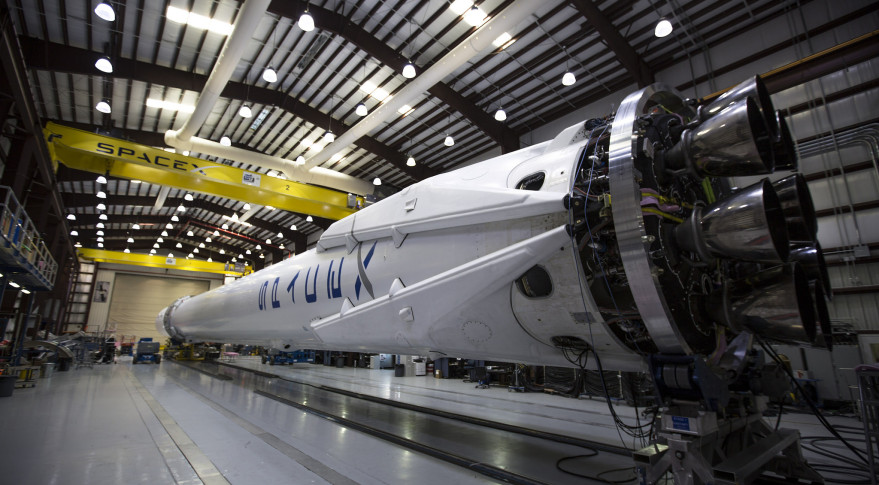SpaceX's Falcon 9 Rocket Certified for Military Launches

WASHINGTON – The U.S. Air Force has certified SpaceX’s Falcon 9 rocket to launch military satellites, completing a nearly two-year process that at times strained the two parties' relationship and establishing a competitor to United Launch Alliance in the national security marketplace.
The Air Force announced the decision May 26, clearing the way for Hawthorne, California-based SpaceX to bid on military launches beginning this year with one of the service's next-generation GPS 3 positioning, navigation and timing satellites.
"This is a very important milestone for the Air Force and the Department of Defense," Air Force Secretary Deborah Lee James said in the press release. "SpaceX's emergence as a viable commercial launch provider provides the opportunity to compete launch services for the first time in almost a decade. Ultimately, leveraging of the commercial space market drives down cost to the American taxpayer and improves our military’s resiliency." [The Rockets and Spaceships of SpaceX (Photos)]
Denver-based ULA has had the U.S. national security launch market all to itself since it was created in 2006 through the merger of the rocket-making operations of Boeing and Lockheed Martin, which previously were bitter rivals in this industry sector.
Air Force officials originally expected SpaceX to earn certification by the end of 2014, but the service announced in January that about 20 percent of the work remained. The delay led the Air Force to re-evaluate its certification process.
The process entailed a thorough Air Force review of three successful Falcon 9 launches, the last of which took place in early 2014. Among the problems that delayed certification as identified in a March report by an independent panel was SpaceX's expectation that its successful track record was enough to win certification and the Air Force’s push for design changes to the Falcon 9.
According to industry sources, SpaceX's practice of tweaking certain parameters of the rocket in between launches also was a factor.
Get the Space.com Newsletter
Breaking space news, the latest updates on rocket launches, skywatching events and more!
"This is an important step toward bringing competition to National Security Space launch," Elon Musk, SpaceX's founder chief executive, said in the May 26 release. "We thank the Air Force for its confidence in us and look forward to serving it well."
The Air Force says it dedicated more than $60 million and 150 people to the certification process, which was established in a 2013 Cooperative Research and Development Agreement with SpaceX that the service has declined to release in any form. In the May 26 release, the service said certification involved 2,800 discreet tasks including verification of 160 payload interface requirements, 21 major subsystem reviews and 700 audits to establish a technical baseline.
The decision comes less than three weeks after the Air Force announced it had revised the agreement so that SpaceX could earn certification even with several issues outstanding provided the company presents a mutually acceptable plan and schedule for resolving them.
Among those open issues identified by the Air Force: SpaceX integrates satellites with its rockets horizontally, but the Air Force prefers vertical integration; SpaceX’s planned addition of GPS-based launch vehicle tracking; information assurance; and secure flight termination.
To date, SpaceX is the only company besides ULA to win certification for military launches.
SpaceX is developing a much larger rocket called the Falcon Heavy that is expected to debut later this year or next year. SpaceX in April sent the the Air Force an updated letter of intent outlining a certification process for the Falcon Heavy, a process the company hopes to complete by 2017.
Meanwhile, the newly certified Falcon 9 will compete head to head against ULA's workhorse Atlas V, whose future availability is in question due to a congressional ban, whose final terms are in a state of legislative flux, on the Russian-built engine that powers its first stage. ULA, which is phasing out its Delta IV rocket, hopes to field a new vehicle dubbed Vulcan around 2020 but continue launching Atlas Vs until around 2025.
This story was provided by Space News, dedicated to covering all aspects of the space industry.
Join our Space Forums to keep talking space on the latest missions, night sky and more! And if you have a news tip, correction or comment, let us know at: community@space.com.
Mike Gruss is a veteran defense reporter and Editor-in-Chief of Sightline Media Group, which includes Army Times, Air Force Times, Dense News, Military Times and Navy Times. From 2013 to 2016, Mike served as a Senior Staff Writer for SpaceNews covering national security space programs and military space policy in the U.S. Congress. Mike earned a bachelor's degree in English and American Studies from Miami University and has previously wrote for the Journal Gazette in Fort Wayne, Indiana and the Virginian-Pilot in Virginia before joining SpaceNews. Prior to joining Sightline in 2017, he was a senior editor of FedTech magazine covering technology in federal government. You can see Mike's latest project on Twitter.










